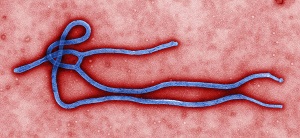 |
| Ebola virus under an electron microscope--Courtesy of CDC |
Ebola virus disease researchers have now shown that a single monoclonal antibody, harvested from a human survivor of EVD, is 100% effective in monkeys given a lethal dose of the virus. The findings may lead to the development of a drug that gives full protection against the virus.
Investigators from the U.S. Army Medical Research Institute of Infectious Diseases (USAMRIID) published their work last week in the journal Science.
While several clinical trials have started since the Ebola virus epidemic spread in Western Africa, there still is no licensed drug against the virus. A monoclonal antibody can recognize one specific region on a virus and may therefore become a valuable tool in an effective therapy against EVD.
The team administered a lethal dose of the Zaire Ebola virus to rhesus macaques and those treated with daily intravenous injections of the monoclonal antibody, mAb114, three days after infection were free of EVD symptoms. The monkeys without the antibody developed the classical symptoms of the disease.
First developed after the 1995 Ebola virus outbreak in Kikwit, Democratic Republic of the Congo, mAb114 was isolated from the blood samples of a survivor of the disease and expanded in volume to test its efficacy against the disease.
"While several antibody 'cocktails' have been tested, this is the first time we've evaluated a single antibody and demonstrated protection in nonhuman primates," John Trefry, principal investigator of the study, said in a release. Since it is only a single antibody the resulting regulatory process will also be simpler and hopefully faster.
- here's the release
- get the Science abstract